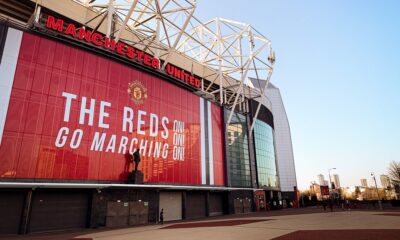Chelsea
Chelsea – The Greatest Football Team You Will Never Love
Following another turbulent week at Stamford Bridge, our contributor Joey Mills looks at how and why Chelsea have quickly become a club that nobody else likes.
On Wednesday evening a rampant Chelsea side completed an astonishing comeback, scoring a late penalty to drag opponents Manchester United kicking and screaming into extra-time in the Capital One Cup fourth round. The match was 3-3 going into the extra period, and after more dramatic twists and turns Chelsea’s free-flowing attacking three of Juan Mata, Oscar and Eden Hazard, coupled with the industry of the excellent Ramires, edged out the Red Devils 5-4.
Argue if you will about the semantics of Chelsea’s dramatic penalty coming four minutes into the allotted three minutes injury time, but there is no denying that Wednesday’s match was cracking entertainment. In fact, the same has been true of both Chelsea and Manchester United’s outings this season. The pair had clashed only four days previously in a match that, while blighted by controversy which we will look into later, was another enthralling clash from a footballing standpoint.
This has been the story of Chelsea’s season. Right from the off, Chelsea contested an excellent Community Shield clash with Premier League champions Manchester City. The North Londoner’s reputation as entertainers was maintained in the club’s second league game, when they shared six goals with newly-promoted Reading in a thrilling 4-2 win. The signings of Hazard and Oscar to accompany the already-established Spanish wizard Juan Mata lent Chelsea a fluid, free-flowing shape. This coupled effectively with striker Fernando Torres’ ability to bring his teammates into the attacks with his passing and movement, have made Chelsea a must-watch club for fans of the beautiful game.
Of course it wasn’t always this way. While Stamford Bridge became the home of both the FA Cup and Champions League titles in the closing weeks of last season, Chelsea did not receive unconditional plaudits. Manager Roberto Di Matteo’s achievement, in steering what had looked a sinking ship when he took over in March, to the club’s most-desired honour was widely-lauded. However the manner with which he claimed European football’s top prize was criticised for its unattractiveness and cynicism. The dreaded Stoke City comparison was even bandied about by people who have smugly, and somewhat unfairly, made Tony Pulis’ men a by-word for aesthetically grim functionality. Chelsea’s approach against both Barcelona and their final opposition Bayern Munich was a rear-guard action, accompanied by finding the most direct route to powerful Ivorian frontman Didier Drogba. While it can be argued, quite rightly when taking into account results, that this approach proved prudent, the lack of fashionable football on display did little to win over non-partisans.
However with squeaky-bum time out of the way and two cups in the bag, Di Matteo’s services were retained by Chelsea’s owner, the notoriously trigger-happy Roman Abramovich. And with the time and resources to assemble a squad more in-keeping with the flair the Russian oligarch has long wanted from a Chelsea line-up, Di Matteo did a creditable job of assembling and organising a team who can play most off the park with their creative, incisive play. However the Blues continue to be sneered at by a large section of the footballing public. And sadly, this has little to do with on-pitch endeavours.
The first red mark in Chelsea’s copybook is their captain (leader, legend; to quote the obnoxious Stamford Bridge banner) John Terry. Many column inches, Sky Sports News tickers and phone-in minutes have been devoted to the subject of both his charge of racism and his scandalous affair with a teammate’s wife. I won’t re-tread old ground and over-elaborate with the details here, but it is fair to say that Chelsea Football Club’s support of their erstwhile centre-half during these Public Relations firestorms has served to erode the image of a once-respected club. The majority of neutral fans find it hard to warm to a club that not only protects, but champions one of the game’s more unsavoury figures.
The second major aspect in Chelsea’s failed quest to be loved was in evidence just this past Sunday. It is not for myself, nor anyone in the press to decide whether Chelsea’s allegations of racial abuse by Mark Clattenburg directed towards John Obi Mikel and Juan Mata are genuine. But what has emanated from the saga so far is that public opinion has not been behind the Chelsea players the same way most observers came out in support of Patrice Evra and Anton Ferdinand in similar circumstances. Chelsea’s own poor handling of the issue of racism recently has led many to view these allegations as disingenuous and bitter. After a football match where Chelsea, despite losing 3-2, would feel rightly hard-done by after various calls from the officials went against them, they could have easily emerged positively in the eyes of the wider populace. They played some delicious stuff against a Manchester United side who looked unplayable for the first 25 minutes, and were only denied by poor officiating. However any PR boom the club would have enjoyed through being the attractive, downtrodden underdogs coming out of Sunday’s clash was lost, rightly or wrongly, in the midst of another racism storm.
The third factor working against Chelsea’s eminently watchable football and glittering cast of global talent being overlooked by the neutral observer is simply the spectre of success. Football as a whole used to laud its champions, no matter who they were. England as a whole was proud of the dominant Bill Shankly and Bob Paisley Liverpool sides. Manchester United’s European Cup success of 1968 was greeted warmly by most domestic followers, after what the club had overcome in Munich a decade earlier. However these days a bitterness has developed. Since the Premier League began, and the top six has become almost a closed shop (the odd Newcastle or Aston Villa appearance aside), an “us and them” attitude has developed in English football. Fans of the so-called “smaller” clubs no longer revel in the successes of their more illustrious rivals, and Chelsea are victims of this trend. As one of the most decorated teams of the last decade, Chelsea have opened themselves up to the same scorn that Manchester United and Arsenal have long tolerated. Manchester City are also finding themselves in the same boat. It’s a simple fact that English football fans no longer enjoy a success that isn’t solely their own.
There is no doubting that Chelsea have been the value-for-money team in the Premier League this season. Whether the adapted tiki-taka model they use will be robust enough to see them over the finish line as champions is unclear. But it seems inevitable that whether they secure glory come season’s end or not, you probably won’t find anyone other than the Chelsea die-hards celebrating the success.















